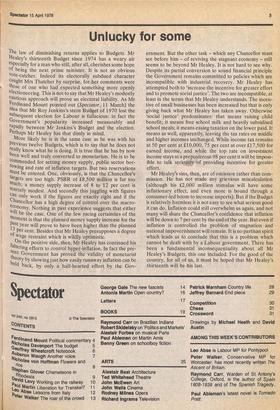Unlucky for some
The law of diminishing returns applies to Budgets. Mr Healey's thirteenth Budget since 1974 has a weary air especially for a man who still, after all, cherishes some hope of being the next prime minister. It is not an obvious vote-catcher. Indeed its electorally subdued character caught Mrs Thatcher by surprise, for her comments were those of one who had expected something more openly electioneering. This is not to say that Mr Healey's modestly cautious approach will prove an electoral liability. As Mr Ferdinand Mount pointed out (Spectator, 11 March) the Idea that Mr Roy Jenkins's stern Budget of 1970 lost the subsequent election for Labour is fallacious: in fact the Government's popularity increased measurably and raPidly between Mr Jenkins's Budget and the election. Perhaps Mr Healey has that dimly in mind. More likely he is in the same case as he was with his Previous twelve Budgets, which is to say that he does not really know what he is doing. It is true that he has by now been well and truly converted to monetarism. He is to be Commended for setting money supply, public sector borrowing and rate of inflation targets. But two reservations must be entered. One, obviously, is that the Chancellor's targets are too high. PSBR of £8,500 million is far too Innen; a money supply increase of 8 to 12 per cent is scarcely moclest. And secondly this juggling with figures can only work if the figures are exactly right and if the Chancellor has a high degree of control over the macroeconomy. Nothing in past experience suggests that either Will be the case. One of the few racing certainties of the Moment is that the planned money supply increase for the ast year will prove to have been higher than the planned 13 per cent. Besides that Mr Healey presupposes a degree of wage restraint which is wildly optimistic. On the positive side, then, Mr Healey has continued his 'altering efforts to control hyper-inflation. In fact the pre sent Government has proved the validity of monetarist theory by showing just how easily runaway inflation can be held back, by only a half-hearted effort by the Gov ernment. But the other task — which any Chancellor must see before him — of reviving the stagnant economy — still seems to be beyond Mr Healey. It is not hard to see why. Despite its partial conversion to sound financial principle the Government remains committed to policies which are incompatible with industrial recovery. Mr Healey has attempted both to 'increase the incentive for greater effort and to promote social justice'. The two are incompatible, at least in the terms that Mr Healey understands. The incentive of small businesses has been increased but that is only giving back what Mr Healey has taken away. Otherwise 'social justice' predominates: that means raising child benefit; it means free school milk and heavily subsidised school meals; it means easing taxation on the lower paid. It means as well, apparently, leaving the tax rates on middle and higher incomes unchanged. While income tax remains at 50 per cent at £10,000, 75 per cent at over £17,500 for earned income, and while the top rate on investment income stays at a preposterous 98 per cent it will be impossible to talk seriously of providing incentive for greater effort.
Mr Healey's sins, then, are of omission rather than commission. He has not made any grievious miscalculation (although his £2,000 million stimulus will have some inflationary effect, and even more is bound through a consumer-led boom to increase imports). But if the Budget is relatively harmless it is not easy to see what serious good it can do. Inflation could still overwhelm us again, and not many will share the Chancellor's confidence that inflation will be down to 7 per cent by the end of the year. But even if inflation is controlled the problem of stagnation and national impoverishment will remain. It is no partisan spirit which leads us to conclude that this is a problem which cannot be dealt with by a Labour government. There has been a fundamental inconsequentiality about all Mr Healey's Budgets, this one included. For the good of the country, for all of us, it must be hoped that Mr Healey's thirteenth will be his last.


































 Previous page
Previous page